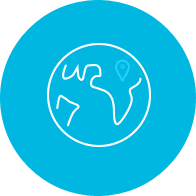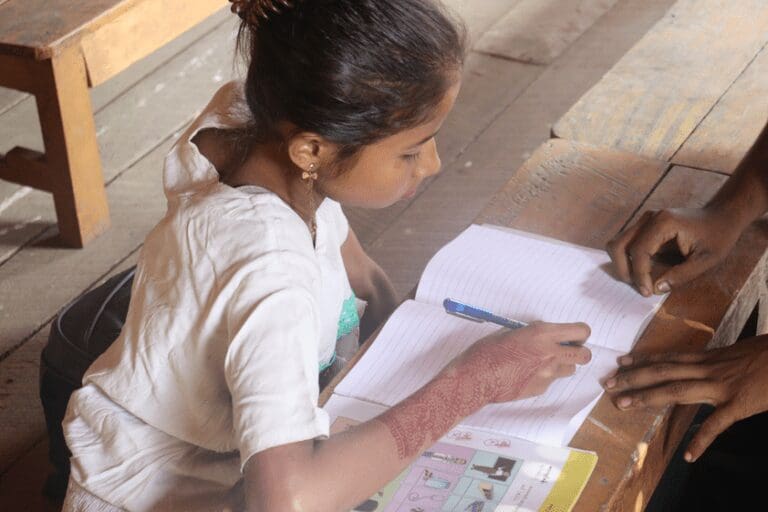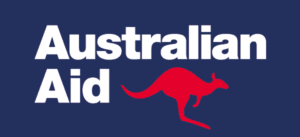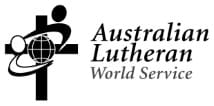Conflict and poverty mean children in Rakhine State struggle to access quality education. The project is supported by the Australian Government through the Australian NGO Cooperation Program (ANCP).

What
Safe and Inclusive Education for Children in Rakhine State; Myanmar: Education in Emergencies

Where
Sittwe and Pauktaw Townships, Rakhine State

Who
11,046 children and 400 teachers and parents (total 11,446 people)

Partners
LWF Myanmar, DFAT
New future in sight
In Myanmar, your work focuses on supporting children with disabilities to go to school, making sure no child is excluded from education, and safeguarding children from danger.

Nay Chi is 11 years old, and has lived in a Displaced Persons Camp in Rakhine State in Myanmar nearly her whole life.
Her dad died during the conflict that forced the family here, and now her mum works as a cleaner to protect the children from starving.
Nay Chi lives with a disability that severely limits her vision. Before your ALWS help through our partner LWF Myanmar, she struggled at school. She could not see the lessons on the whiteboard, read from books or do drawing or painting.
Your ALWS work in Displaced Persons Camps in Myanmar, in partnership with the Australian Government, has a special focus on girls, and children with disabilities, who may otherwise
miss out on education.
The good news is Nay Chi’s visual impairment can be treated, and she is already able to join in more fully at school. She’s reached Grade 1, and now looks forward to a brighter future:
“If I am educated, I will be able to achieve my goal.
Then, I will have a better life and can help my mother, and my brother.
I will try to become a teacher.”
– Nay Chi
ALWS acknowledges the support of the Australian Government through the Australian NGO Cooperation Program (ANCP).

Find out more about...
| Myanmar (Education) | |
| What | Safe and Inclusive Education for Children in Rakhine State; Myanmar: Education in Emergencies |
| Local Partner | LWF Myanmar |
| Where | Sittwe and Pauktaw Townships, Rakhine State |
| Who | 11,046 children and 400 teachers and parents (total 11,446 people) |
| ALWS Action | ALWS: $57,500 DFAT: $192,500 Total: $250,000 |
Children from Rohingya communities in Rakhine State have been forced to live in Internally Displaced Persons Camps. Their education has been disrupted, and they face the threat of child trafficking and exploitation.
- 8 camps organized Parent Teacher Associations and hosted Peer Learning Meetings
- Parent Teacher Associations were supported to be more gender and disability inclusive, and to support parents help children’s learning
- Needs assessments for 74 students with disability was conducted and their needs supported
- Parent Teacher Associations regularly monitor school safety and security, and raise awareness on child protection to prevent trafficking and exploitation
- Parent Teacher Associations conducted awareness raising activities to reduce the spread of COVID-19
- Child Clubs met to raise awareness of rights, build leadership skills and promote equal decision making between girls and boys.
Thank you!
Supporting strong community-based structures such as Parent Teachers Associations and child clubs not only ensures project ownership but also project continuity when humanitarian access is limited.
Despite the restriction on movements in Myanmar, project activities have continued with the support of these structures.
More than 11,000 children including children living with disabilities from Rohingya communities in Rakhine State have been supported to access education despite the ongoing civil unrest.
| What | Rights Based Empowerment Program |
| Local Partner | LWF Myanmar |
| Where | Kayin, Chin and Rakhine Districts |
| Who | 46,572 people in partnership with other agencies |
| ALWS Action | ALWS: $196,500 DFAT: $139,500 Total: $336,000 |
Why our help is needed
While many people in Myanmar face multiple challenges, people who have added vulnerabilities – language barriers, lack of secure land tenure, lack of access to markets – need extra support.
Our action together in 2022
• 115 farmers using climate smart agricultural practices such as System of Rice Intensification
• 97 households established new income sources
• 39 infrastructure projects constructed with communities, including health clinics, roads, latrines, school renovations, bridges, meeting
halls, irrigation systems
• 87% of families with improved water and sanitation facilities
• 23 communities developed disaster preparedness plans
• 42% of families reported a change that women have at least equal power in household decision making
• 199 meetings between rights holders and duty bearers to support rights based community development.
What we’re learning
It is important to work in collaboration and in close coordination with other international, national and local civil society organisations. The benefits of this have been evident since the military coup especially in ensuring continued access to services and provide training to communities in remote locations.
Our impact
Our concerted efforts at improving gender equity in a context where women have historically had limited rights, leadership and decision-making power has seen more women taking on leadership positions compared to previous years. Additionally, women are reporting greater participation and decision making in families and community activities.
| What |
A Rights-Based Advocacy Approach |
| Local Partner | LWF Myanmar |
| Where | Rakhine, Chin and Kayin States |
| Who | 1,847 direct beneficiaries: 508 women; 494 men; 433 girls; 412 boys In partnership with other agencies |
| ALWS Action | This project runs from 2020-2022. Total funding provided across the project period from ALWS $133,295 (NB none sent in 2022) |
Why our help is needed
Vulnerable communities in rural areas of Myanmar face challenges in accessing basic human rights, including their right to claim
and access their land, their right to a legal identity, and the rights of women.
Our action together in 2022
• 281 farmers received land registration certificates
• 410 people (including 278 children) obtained legal documentation
• 49 women increased their knowledge and capacity to claim their rights
• 24 community based organisations have increased their advocacy capacity
• 1 local representative presented key advocacy priorities in international forums.
What we’re learning
An advocacy approach that is local to global i.e., that assesses human rights at grassroot levels against global standards and holds national governments to account is an effective way of lifting the human rights of disenfranchised and marginalised communities.
Additionally, innovative products such as comic books, animated videos and community guidebooks are effective tools of communicating human rights.
Our impact
Close to 2,000 disenfranchised people have been supported to access rights to land, legal documents including being represented in international human rights forums.
Gifts of Grace
Banana Chip Business
Best of the Bunch
Support a farmer cooperative to start a banana chip business.
-
$154
- Learn more
Gift in your Will
Lives you touch
How do you want to be remembered?
Now you can keep blessing others with a gift in your Will...

